Business Economics: Patterns and Trends in UK Trade and Policy
VerifiedAdded on 2022/12/30
|11
|2152
|85
Report
AI Summary
This report provides a comprehensive analysis of the patterns and trends in UK trade, focusing on the economic context, including the UK's economic growth and development, and the impact of the balance of trade. The report examines key economic indicators and discusses the role of the government in advancing business success within the country, including financial arrangements and strategic partnerships. It analyzes economic issues such as sluggish economic development, declining productivity, and government debt, providing an economic framework to understand these challenges. The report also explores how government policies, such as subsidies and support for the SME sector, can influence business performance and contribute to economic growth. The study concludes with a summary of the key findings and references relevant academic sources.
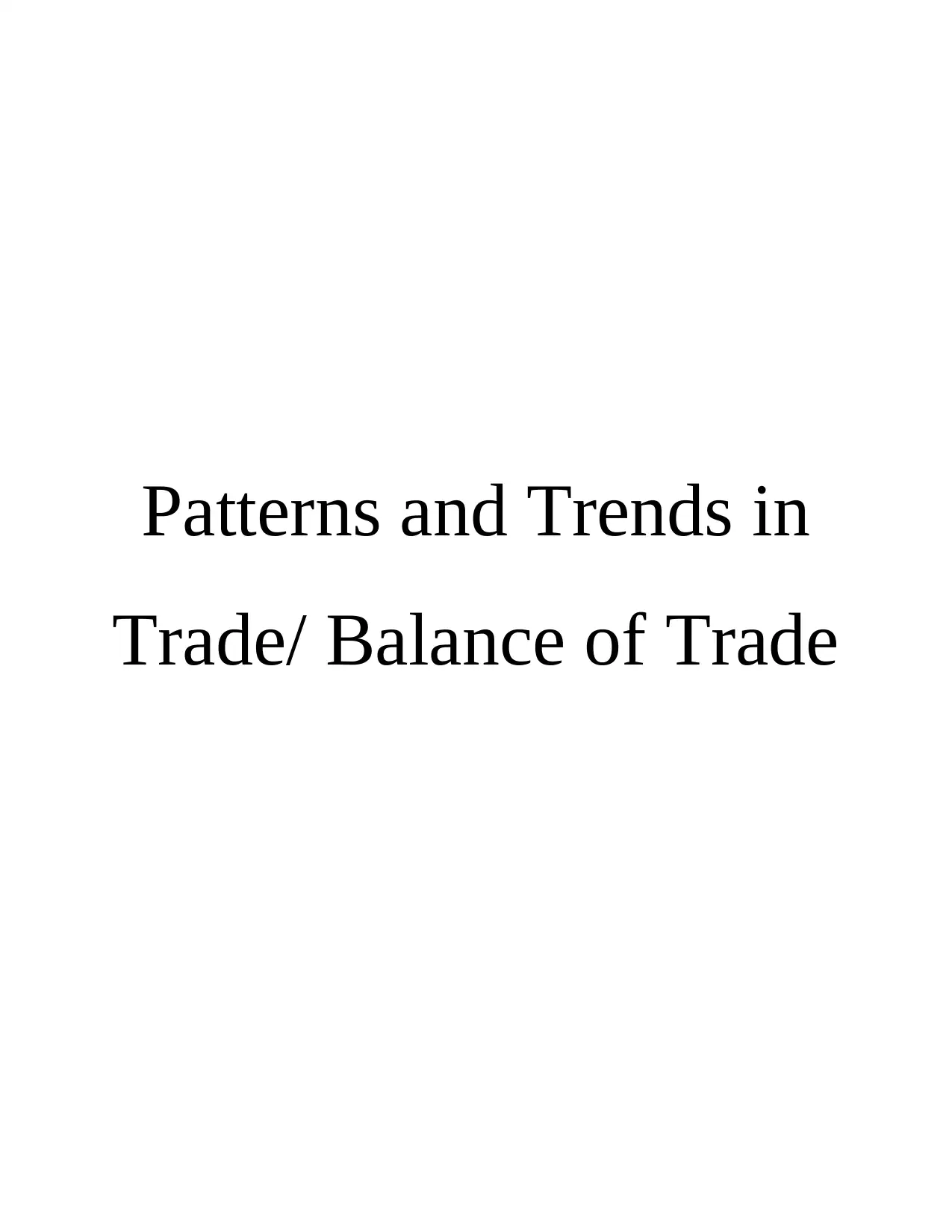
Patterns and Trends in
Trade/ Balance of Trade
Trade/ Balance of Trade
Paraphrase This Document
Need a fresh take? Get an instant paraphrase of this document with our AI Paraphraser
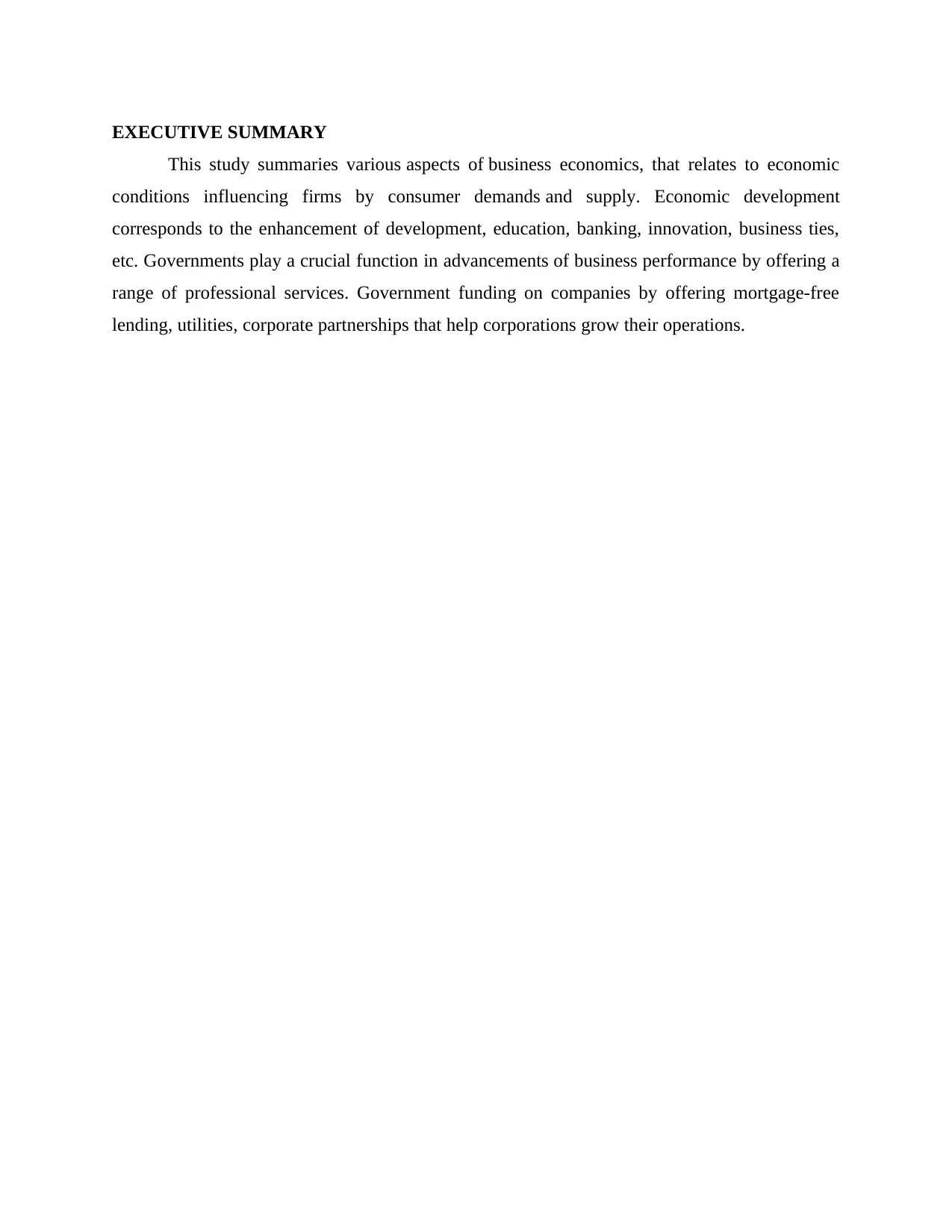
EXECUTIVE SUMMARY
This study summaries various aspects of business economics, that relates to economic
conditions influencing firms by consumer demands and supply. Economic development
corresponds to the enhancement of development, education, banking, innovation, business ties,
etc. Governments play a crucial function in advancements of business performance by offering a
range of professional services. Government funding on companies by offering mortgage-free
lending, utilities, corporate partnerships that help corporations grow their operations.
This study summaries various aspects of business economics, that relates to economic
conditions influencing firms by consumer demands and supply. Economic development
corresponds to the enhancement of development, education, banking, innovation, business ties,
etc. Governments play a crucial function in advancements of business performance by offering a
range of professional services. Government funding on companies by offering mortgage-free
lending, utilities, corporate partnerships that help corporations grow their operations.
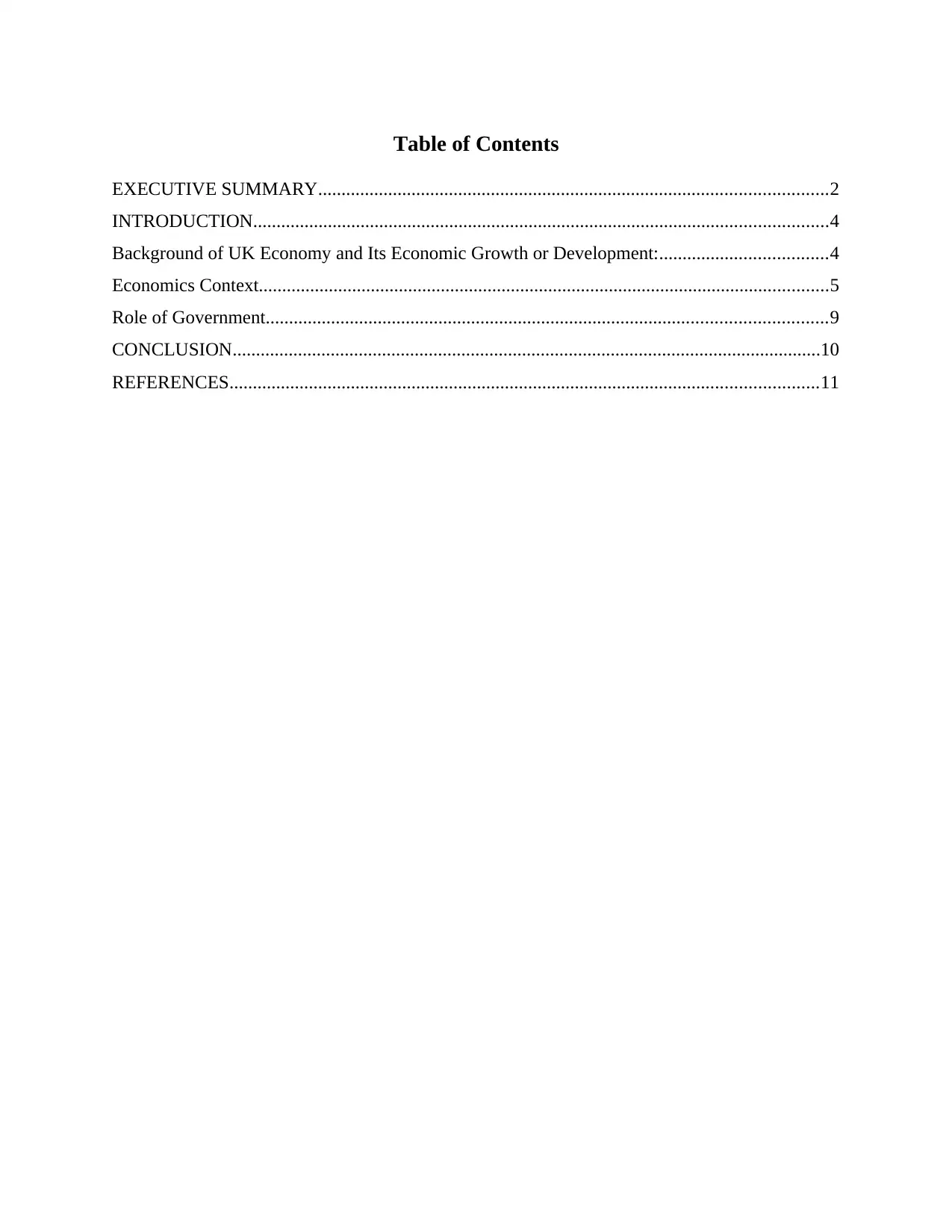
Table of Contents
EXECUTIVE SUMMARY.............................................................................................................2
INTRODUCTION...........................................................................................................................4
Background of UK Economy and Its Economic Growth or Development:....................................4
Economics Context..........................................................................................................................5
Role of Government........................................................................................................................9
CONCLUSION..............................................................................................................................10
REFERENCES..............................................................................................................................11
EXECUTIVE SUMMARY.............................................................................................................2
INTRODUCTION...........................................................................................................................4
Background of UK Economy and Its Economic Growth or Development:....................................4
Economics Context..........................................................................................................................5
Role of Government........................................................................................................................9
CONCLUSION..............................................................................................................................10
REFERENCES..............................................................................................................................11
⊘ This is a preview!⊘
Do you want full access?
Subscribe today to unlock all pages.

Trusted by 1+ million students worldwide
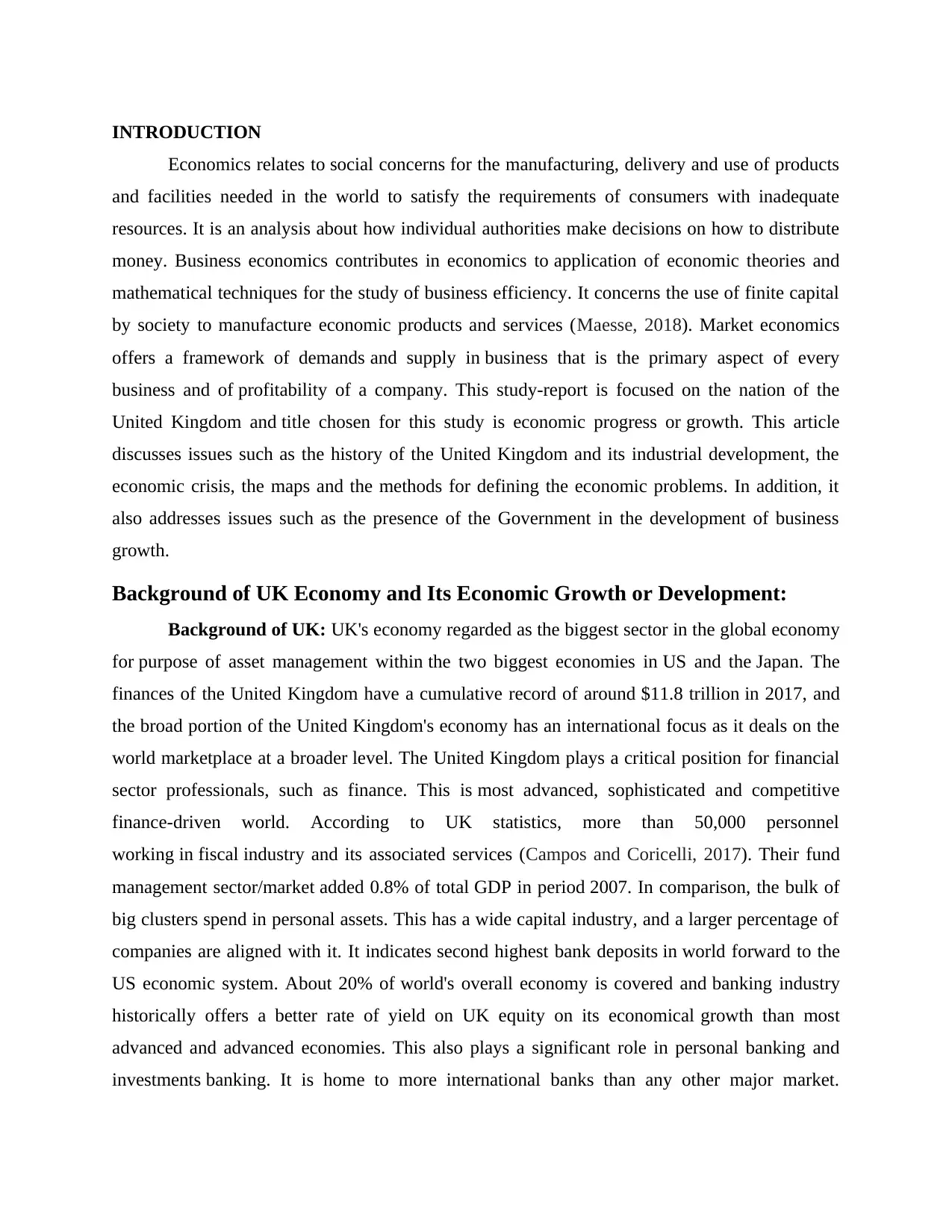
INTRODUCTION
Economics relates to social concerns for the manufacturing, delivery and use of products
and facilities needed in the world to satisfy the requirements of consumers with inadequate
resources. It is an analysis about how individual authorities make decisions on how to distribute
money. Business economics contributes in economics to application of economic theories and
mathematical techniques for the study of business efficiency. It concerns the use of finite capital
by society to manufacture economic products and services (Maesse, 2018). Market economics
offers a framework of demands and supply in business that is the primary aspect of every
business and of profitability of a company. This study-report is focused on the nation of the
United Kingdom and title chosen for this study is economic progress or growth. This article
discusses issues such as the history of the United Kingdom and its industrial development, the
economic crisis, the maps and the methods for defining the economic problems. In addition, it
also addresses issues such as the presence of the Government in the development of business
growth.
Background of UK Economy and Its Economic Growth or Development:
Background of UK: UK's economy regarded as the biggest sector in the global economy
for purpose of asset management within the two biggest economies in US and the Japan. The
finances of the United Kingdom have a cumulative record of around $11.8 trillion in 2017, and
the broad portion of the United Kingdom's economy has an international focus as it deals on the
world marketplace at a broader level. The United Kingdom plays a critical position for financial
sector professionals, such as finance. This is most advanced, sophisticated and competitive
finance-driven world. According to UK statistics, more than 50,000 personnel
working in fiscal industry and its associated services (Campos and Coricelli, 2017). Their fund
management sector/market added 0.8% of total GDP in period 2007. In comparison, the bulk of
big clusters spend in personal assets. This has a wide capital industry, and a larger percentage of
companies are aligned with it. It indicates second highest bank deposits in world forward to the
US economic system. About 20% of world's overall economy is covered and banking industry
historically offers a better rate of yield on UK equity on its economical growth than most
advanced and advanced economies. This also plays a significant role in personal banking and
investments banking. It is home to more international banks than any other major market.
Economics relates to social concerns for the manufacturing, delivery and use of products
and facilities needed in the world to satisfy the requirements of consumers with inadequate
resources. It is an analysis about how individual authorities make decisions on how to distribute
money. Business economics contributes in economics to application of economic theories and
mathematical techniques for the study of business efficiency. It concerns the use of finite capital
by society to manufacture economic products and services (Maesse, 2018). Market economics
offers a framework of demands and supply in business that is the primary aspect of every
business and of profitability of a company. This study-report is focused on the nation of the
United Kingdom and title chosen for this study is economic progress or growth. This article
discusses issues such as the history of the United Kingdom and its industrial development, the
economic crisis, the maps and the methods for defining the economic problems. In addition, it
also addresses issues such as the presence of the Government in the development of business
growth.
Background of UK Economy and Its Economic Growth or Development:
Background of UK: UK's economy regarded as the biggest sector in the global economy
for purpose of asset management within the two biggest economies in US and the Japan. The
finances of the United Kingdom have a cumulative record of around $11.8 trillion in 2017, and
the broad portion of the United Kingdom's economy has an international focus as it deals on the
world marketplace at a broader level. The United Kingdom plays a critical position for financial
sector professionals, such as finance. This is most advanced, sophisticated and competitive
finance-driven world. According to UK statistics, more than 50,000 personnel
working in fiscal industry and its associated services (Campos and Coricelli, 2017). Their fund
management sector/market added 0.8% of total GDP in period 2007. In comparison, the bulk of
big clusters spend in personal assets. This has a wide capital industry, and a larger percentage of
companies are aligned with it. It indicates second highest bank deposits in world forward to the
US economic system. About 20% of world's overall economy is covered and banking industry
historically offers a better rate of yield on UK equity on its economical growth than most
advanced and advanced economies. This also plays a significant role in personal banking and
investments banking. It is home to more international banks than any other major market.
Paraphrase This Document
Need a fresh take? Get an instant paraphrase of this document with our AI Paraphraser
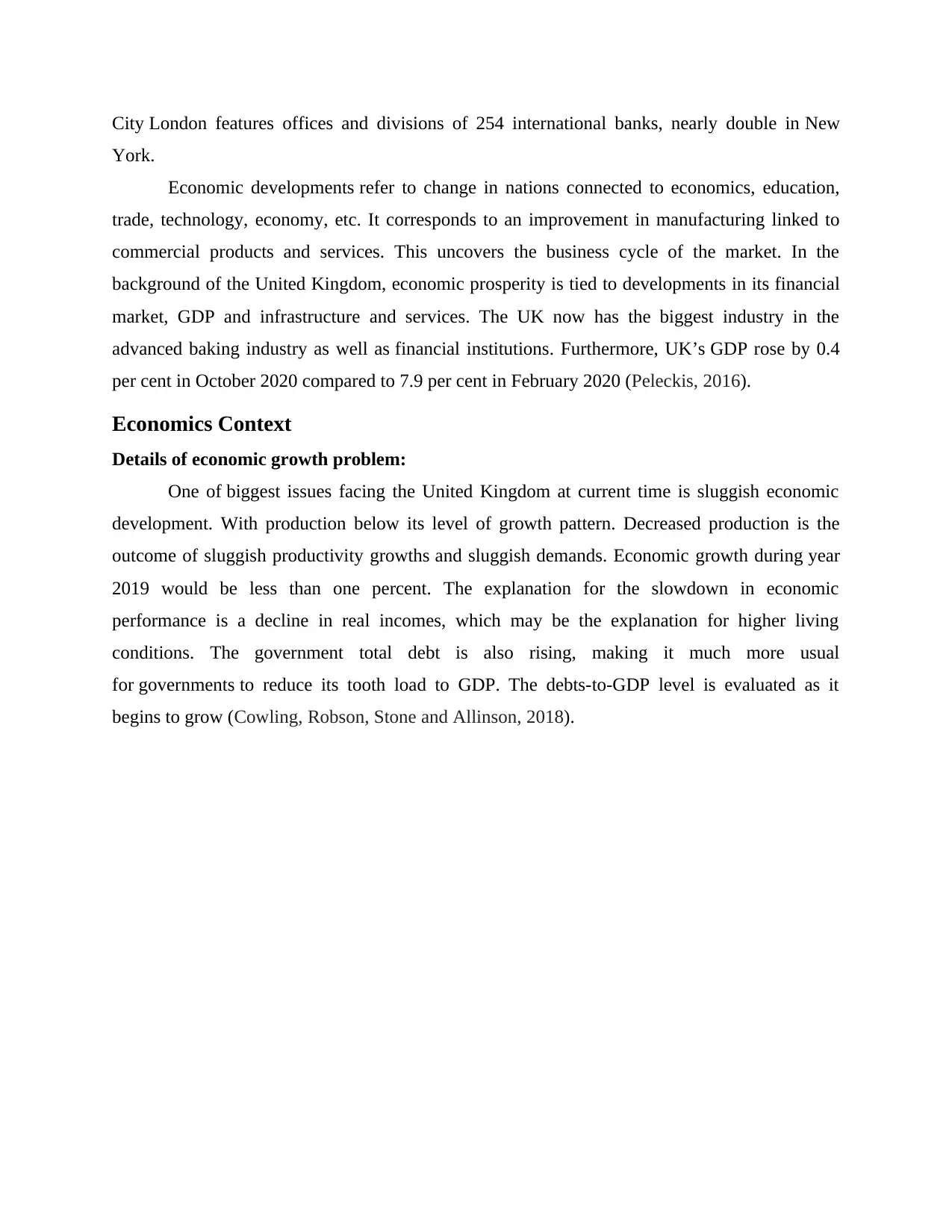
City London features offices and divisions of 254 international banks, nearly double in New
York.
Economic developments refer to change in nations connected to economics, education,
trade, technology, economy, etc. It corresponds to an improvement in manufacturing linked to
commercial products and services. This uncovers the business cycle of the market. In the
background of the United Kingdom, economic prosperity is tied to developments in its financial
market, GDP and infrastructure and services. The UK now has the biggest industry in the
advanced baking industry as well as financial institutions. Furthermore, UK’s GDP rose by 0.4
per cent in October 2020 compared to 7.9 per cent in February 2020 (Peleckis, 2016).
Economics Context
Details of economic growth problem:
One of biggest issues facing the United Kingdom at current time is sluggish economic
development. With production below its level of growth pattern. Decreased production is the
outcome of sluggish productivity growths and sluggish demands. Economic growth during year
2019 would be less than one percent. The explanation for the slowdown in economic
performance is a decline in real incomes, which may be the explanation for higher living
conditions. The government total debt is also rising, making it much more usual
for governments to reduce its tooth load to GDP. The debts-to-GDP level is evaluated as it
begins to grow (Cowling, Robson, Stone and Allinson, 2018).
York.
Economic developments refer to change in nations connected to economics, education,
trade, technology, economy, etc. It corresponds to an improvement in manufacturing linked to
commercial products and services. This uncovers the business cycle of the market. In the
background of the United Kingdom, economic prosperity is tied to developments in its financial
market, GDP and infrastructure and services. The UK now has the biggest industry in the
advanced baking industry as well as financial institutions. Furthermore, UK’s GDP rose by 0.4
per cent in October 2020 compared to 7.9 per cent in February 2020 (Peleckis, 2016).
Economics Context
Details of economic growth problem:
One of biggest issues facing the United Kingdom at current time is sluggish economic
development. With production below its level of growth pattern. Decreased production is the
outcome of sluggish productivity growths and sluggish demands. Economic growth during year
2019 would be less than one percent. The explanation for the slowdown in economic
performance is a decline in real incomes, which may be the explanation for higher living
conditions. The government total debt is also rising, making it much more usual
for governments to reduce its tooth load to GDP. The debts-to-GDP level is evaluated as it
begins to grow (Cowling, Robson, Stone and Allinson, 2018).
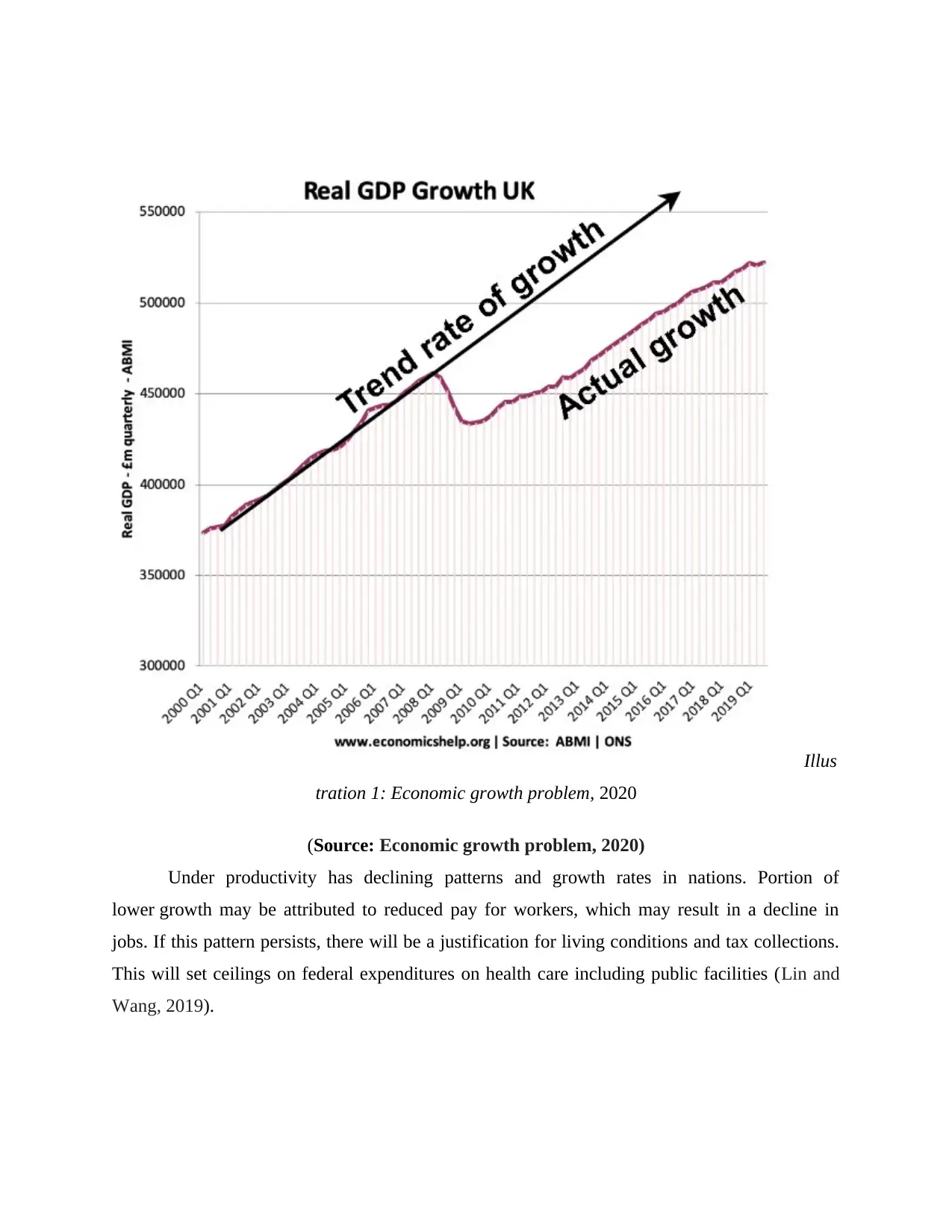
Illus
tration 1: Economic growth problem, 2020
(Source: Economic growth problem, 2020)
Under productivity has declining patterns and growth rates in nations. Portion of
lower growth may be attributed to reduced pay for workers, which may result in a decline in
jobs. If this pattern persists, there will be a justification for living conditions and tax collections.
This will set ceilings on federal expenditures on health care including public facilities (Lin and
Wang, 2019).
tration 1: Economic growth problem, 2020
(Source: Economic growth problem, 2020)
Under productivity has declining patterns and growth rates in nations. Portion of
lower growth may be attributed to reduced pay for workers, which may result in a decline in
jobs. If this pattern persists, there will be a justification for living conditions and tax collections.
This will set ceilings on federal expenditures on health care including public facilities (Lin and
Wang, 2019).
⊘ This is a preview!⊘
Do you want full access?
Subscribe today to unlock all pages.

Trusted by 1+ million students worldwide
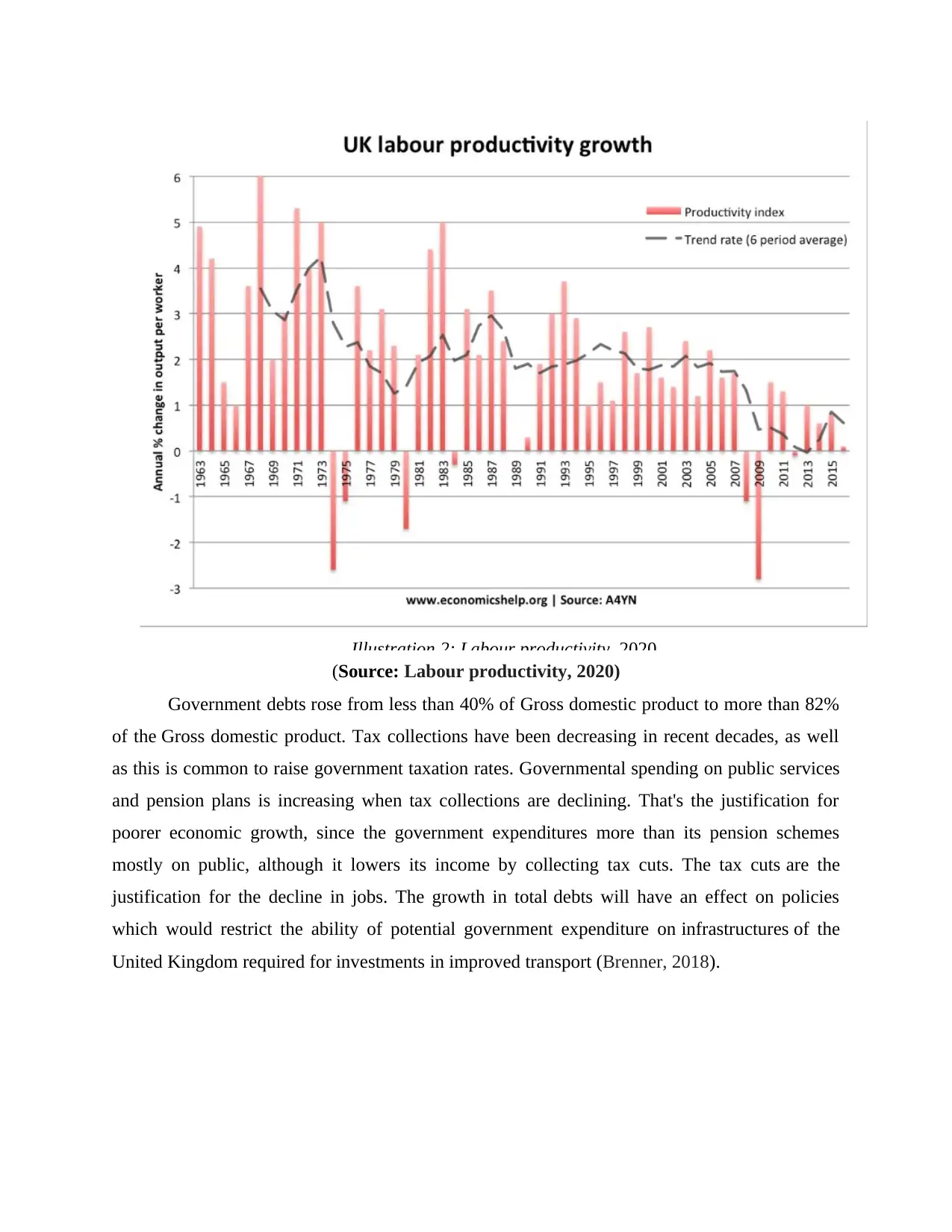
Illustration 2: Labour productivity, 2020
(Source: Labour productivity, 2020)
Government debts rose from less than 40% of Gross domestic product to more than 82%
of the Gross domestic product. Tax collections have been decreasing in recent decades, as well
as this is common to raise government taxation rates. Governmental spending on public services
and pension plans is increasing when tax collections are declining. That's the justification for
poorer economic growth, since the government expenditures more than its pension schemes
mostly on public, although it lowers its income by collecting tax cuts. The tax cuts are the
justification for the decline in jobs. The growth in total debts will have an effect on policies
which would restrict the ability of potential government expenditure on infrastructures of the
United Kingdom required for investments in improved transport (Brenner, 2018).
(Source: Labour productivity, 2020)
Government debts rose from less than 40% of Gross domestic product to more than 82%
of the Gross domestic product. Tax collections have been decreasing in recent decades, as well
as this is common to raise government taxation rates. Governmental spending on public services
and pension plans is increasing when tax collections are declining. That's the justification for
poorer economic growth, since the government expenditures more than its pension schemes
mostly on public, although it lowers its income by collecting tax cuts. The tax cuts are the
justification for the decline in jobs. The growth in total debts will have an effect on policies
which would restrict the ability of potential government expenditure on infrastructures of the
United Kingdom required for investments in improved transport (Brenner, 2018).
Paraphrase This Document
Need a fresh take? Get an instant paraphrase of this document with our AI Paraphraser
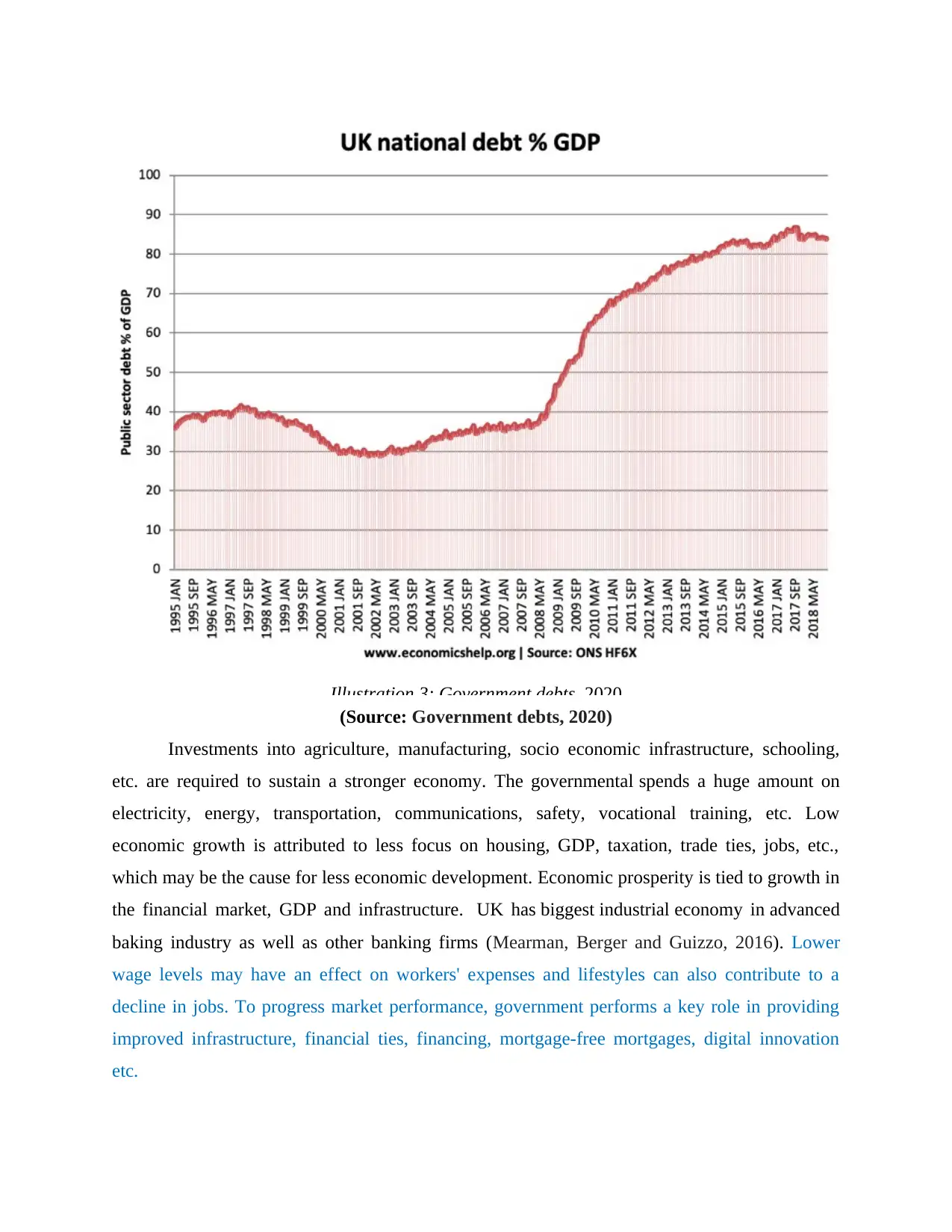
Illustration 3: Government debts, 2020
(Source: Government debts, 2020)
Investments into agriculture, manufacturing, socio economic infrastructure, schooling,
etc. are required to sustain a stronger economy. The governmental spends a huge amount on
electricity, energy, transportation, communications, safety, vocational training, etc. Low
economic growth is attributed to less focus on housing, GDP, taxation, trade ties, jobs, etc.,
which may be the cause for less economic development. Economic prosperity is tied to growth in
the financial market, GDP and infrastructure. UK has biggest industrial economy in advanced
baking industry as well as other banking firms (Mearman, Berger and Guizzo, 2016). Lower
wage levels may have an effect on workers' expenses and lifestyles can also contribute to a
decline in jobs. To progress market performance, government performs a key role in providing
improved infrastructure, financial ties, financing, mortgage-free mortgages, digital innovation
etc.
(Source: Government debts, 2020)
Investments into agriculture, manufacturing, socio economic infrastructure, schooling,
etc. are required to sustain a stronger economy. The governmental spends a huge amount on
electricity, energy, transportation, communications, safety, vocational training, etc. Low
economic growth is attributed to less focus on housing, GDP, taxation, trade ties, jobs, etc.,
which may be the cause for less economic development. Economic prosperity is tied to growth in
the financial market, GDP and infrastructure. UK has biggest industrial economy in advanced
baking industry as well as other banking firms (Mearman, Berger and Guizzo, 2016). Lower
wage levels may have an effect on workers' expenses and lifestyles can also contribute to a
decline in jobs. To progress market performance, government performs a key role in providing
improved infrastructure, financial ties, financing, mortgage-free mortgages, digital innovation
etc.
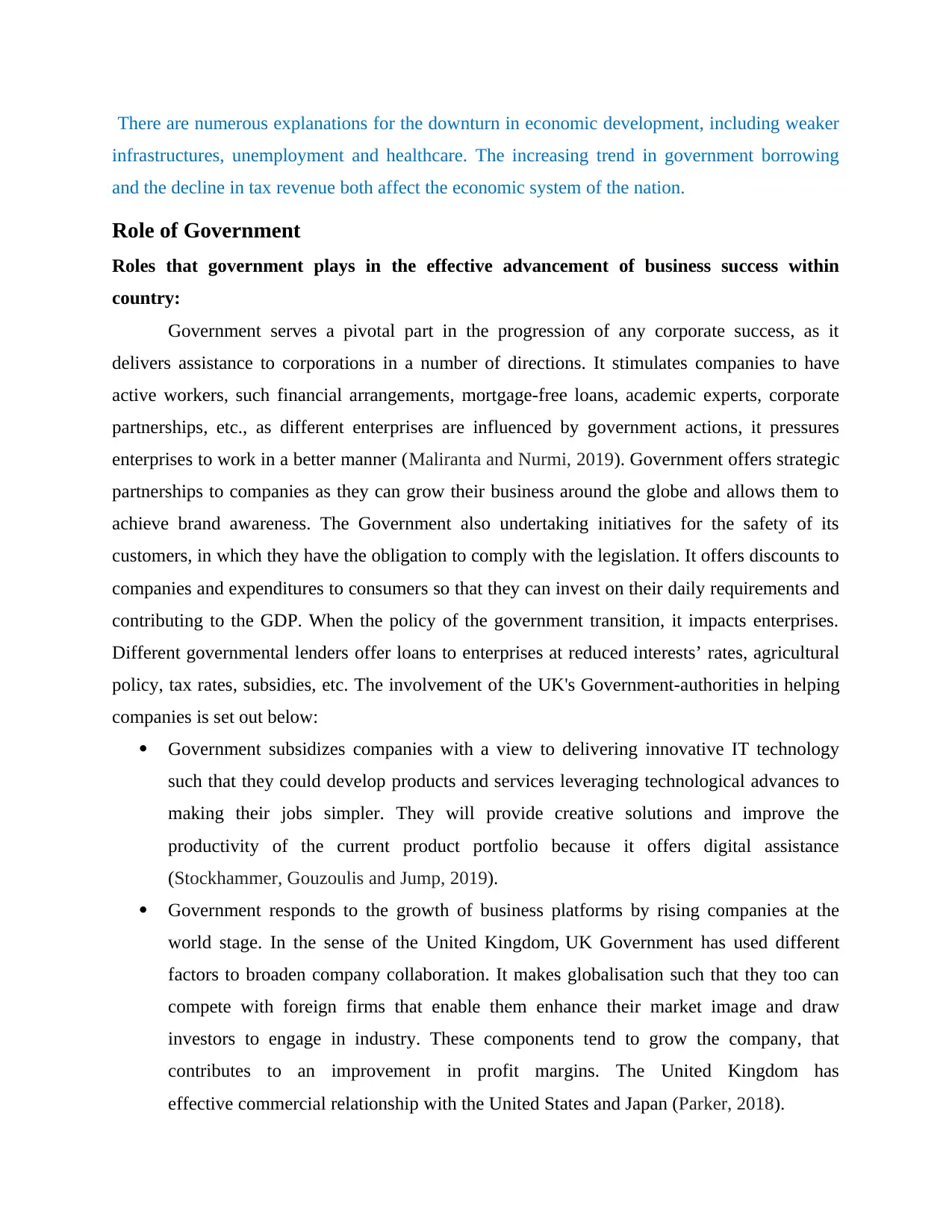
There are numerous explanations for the downturn in economic development, including weaker
infrastructures, unemployment and healthcare. The increasing trend in government borrowing
and the decline in tax revenue both affect the economic system of the nation.
Role of Government
Roles that government plays in the effective advancement of business success within
country:
Government serves a pivotal part in the progression of any corporate success, as it
delivers assistance to corporations in a number of directions. It stimulates companies to have
active workers, such financial arrangements, mortgage-free loans, academic experts, corporate
partnerships, etc., as different enterprises are influenced by government actions, it pressures
enterprises to work in a better manner (Maliranta and Nurmi, 2019). Government offers strategic
partnerships to companies as they can grow their business around the globe and allows them to
achieve brand awareness. The Government also undertaking initiatives for the safety of its
customers, in which they have the obligation to comply with the legislation. It offers discounts to
companies and expenditures to consumers so that they can invest on their daily requirements and
contributing to the GDP. When the policy of the government transition, it impacts enterprises.
Different governmental lenders offer loans to enterprises at reduced interests’ rates, agricultural
policy, tax rates, subsidies, etc. The involvement of the UK's Government-authorities in helping
companies is set out below:
Government subsidizes companies with a view to delivering innovative IT technology
such that they could develop products and services leveraging technological advances to
making their jobs simpler. They will provide creative solutions and improve the
productivity of the current product portfolio because it offers digital assistance
(Stockhammer, Gouzoulis and Jump, 2019).
Government responds to the growth of business platforms by rising companies at the
world stage. In the sense of the United Kingdom, UK Government has used different
factors to broaden company collaboration. It makes globalisation such that they too can
compete with foreign firms that enable them enhance their market image and draw
investors to engage in industry. These components tend to grow the company, that
contributes to an improvement in profit margins. The United Kingdom has
effective commercial relationship with the United States and Japan (Parker, 2018).
infrastructures, unemployment and healthcare. The increasing trend in government borrowing
and the decline in tax revenue both affect the economic system of the nation.
Role of Government
Roles that government plays in the effective advancement of business success within
country:
Government serves a pivotal part in the progression of any corporate success, as it
delivers assistance to corporations in a number of directions. It stimulates companies to have
active workers, such financial arrangements, mortgage-free loans, academic experts, corporate
partnerships, etc., as different enterprises are influenced by government actions, it pressures
enterprises to work in a better manner (Maliranta and Nurmi, 2019). Government offers strategic
partnerships to companies as they can grow their business around the globe and allows them to
achieve brand awareness. The Government also undertaking initiatives for the safety of its
customers, in which they have the obligation to comply with the legislation. It offers discounts to
companies and expenditures to consumers so that they can invest on their daily requirements and
contributing to the GDP. When the policy of the government transition, it impacts enterprises.
Different governmental lenders offer loans to enterprises at reduced interests’ rates, agricultural
policy, tax rates, subsidies, etc. The involvement of the UK's Government-authorities in helping
companies is set out below:
Government subsidizes companies with a view to delivering innovative IT technology
such that they could develop products and services leveraging technological advances to
making their jobs simpler. They will provide creative solutions and improve the
productivity of the current product portfolio because it offers digital assistance
(Stockhammer, Gouzoulis and Jump, 2019).
Government responds to the growth of business platforms by rising companies at the
world stage. In the sense of the United Kingdom, UK Government has used different
factors to broaden company collaboration. It makes globalisation such that they too can
compete with foreign firms that enable them enhance their market image and draw
investors to engage in industry. These components tend to grow the company, that
contributes to an improvement in profit margins. The United Kingdom has
effective commercial relationship with the United States and Japan (Parker, 2018).
⊘ This is a preview!⊘
Do you want full access?
Subscribe today to unlock all pages.

Trusted by 1+ million students worldwide
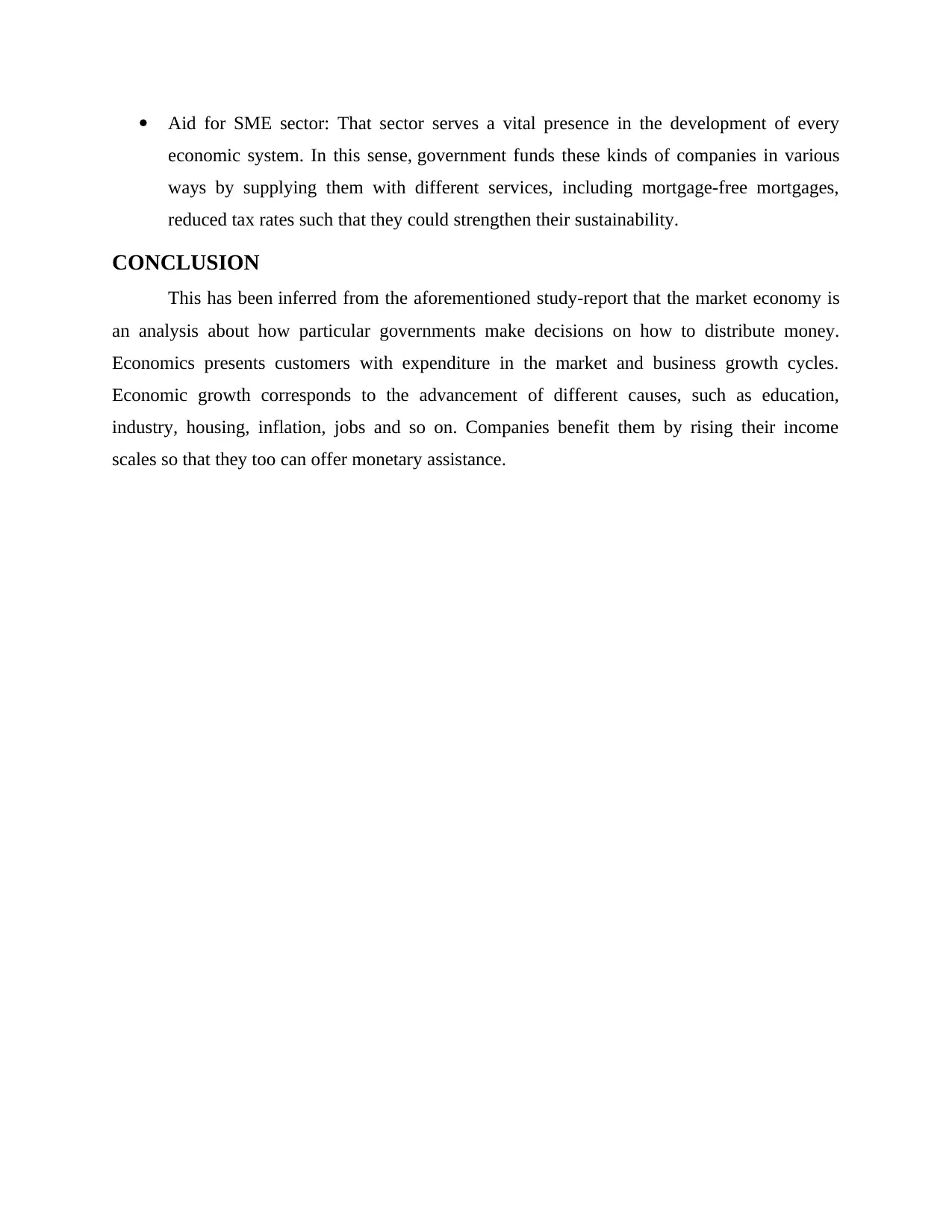
Aid for SME sector: That sector serves a vital presence in the development of every
economic system. In this sense, government funds these kinds of companies in various
ways by supplying them with different services, including mortgage-free mortgages,
reduced tax rates such that they could strengthen their sustainability.
CONCLUSION
This has been inferred from the aforementioned study-report that the market economy is
an analysis about how particular governments make decisions on how to distribute money.
Economics presents customers with expenditure in the market and business growth cycles.
Economic growth corresponds to the advancement of different causes, such as education,
industry, housing, inflation, jobs and so on. Companies benefit them by rising their income
scales so that they too can offer monetary assistance.
economic system. In this sense, government funds these kinds of companies in various
ways by supplying them with different services, including mortgage-free mortgages,
reduced tax rates such that they could strengthen their sustainability.
CONCLUSION
This has been inferred from the aforementioned study-report that the market economy is
an analysis about how particular governments make decisions on how to distribute money.
Economics presents customers with expenditure in the market and business growth cycles.
Economic growth corresponds to the advancement of different causes, such as education,
industry, housing, inflation, jobs and so on. Companies benefit them by rising their income
scales so that they too can offer monetary assistance.
Paraphrase This Document
Need a fresh take? Get an instant paraphrase of this document with our AI Paraphraser
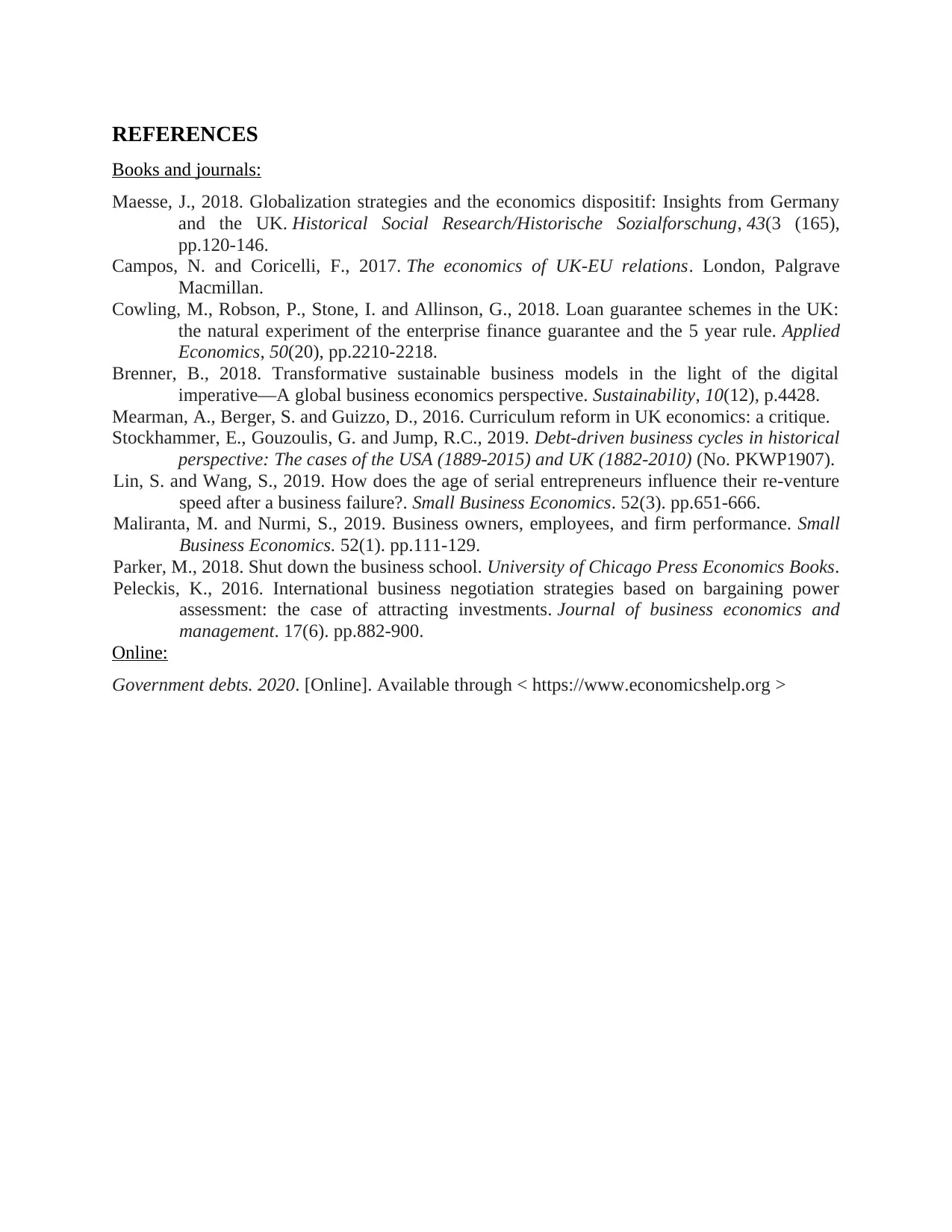
REFERENCES
Books and journals:
Maesse, J., 2018. Globalization strategies and the economics dispositif: Insights from Germany
and the UK. Historical Social Research/Historische Sozialforschung, 43(3 (165),
pp.120-146.
Campos, N. and Coricelli, F., 2017. The economics of UK-EU relations. London, Palgrave
Macmillan.
Cowling, M., Robson, P., Stone, I. and Allinson, G., 2018. Loan guarantee schemes in the UK:
the natural experiment of the enterprise finance guarantee and the 5 year rule. Applied
Economics, 50(20), pp.2210-2218.
Brenner, B., 2018. Transformative sustainable business models in the light of the digital
imperative—A global business economics perspective. Sustainability, 10(12), p.4428.
Mearman, A., Berger, S. and Guizzo, D., 2016. Curriculum reform in UK economics: a critique.
Stockhammer, E., Gouzoulis, G. and Jump, R.C., 2019. Debt-driven business cycles in historical
perspective: The cases of the USA (1889-2015) and UK (1882-2010) (No. PKWP1907).
Lin, S. and Wang, S., 2019. How does the age of serial entrepreneurs influence their re-venture
speed after a business failure?. Small Business Economics. 52(3). pp.651-666.
Maliranta, M. and Nurmi, S., 2019. Business owners, employees, and firm performance. Small
Business Economics. 52(1). pp.111-129.
Parker, M., 2018. Shut down the business school. University of Chicago Press Economics Books.
Peleckis, K., 2016. International business negotiation strategies based on bargaining power
assessment: the case of attracting investments. Journal of business economics and
management. 17(6). pp.882-900.
Online:
Government debts. 2020. [Online]. Available through < https://www.economicshelp.org >
Books and journals:
Maesse, J., 2018. Globalization strategies and the economics dispositif: Insights from Germany
and the UK. Historical Social Research/Historische Sozialforschung, 43(3 (165),
pp.120-146.
Campos, N. and Coricelli, F., 2017. The economics of UK-EU relations. London, Palgrave
Macmillan.
Cowling, M., Robson, P., Stone, I. and Allinson, G., 2018. Loan guarantee schemes in the UK:
the natural experiment of the enterprise finance guarantee and the 5 year rule. Applied
Economics, 50(20), pp.2210-2218.
Brenner, B., 2018. Transformative sustainable business models in the light of the digital
imperative—A global business economics perspective. Sustainability, 10(12), p.4428.
Mearman, A., Berger, S. and Guizzo, D., 2016. Curriculum reform in UK economics: a critique.
Stockhammer, E., Gouzoulis, G. and Jump, R.C., 2019. Debt-driven business cycles in historical
perspective: The cases of the USA (1889-2015) and UK (1882-2010) (No. PKWP1907).
Lin, S. and Wang, S., 2019. How does the age of serial entrepreneurs influence their re-venture
speed after a business failure?. Small Business Economics. 52(3). pp.651-666.
Maliranta, M. and Nurmi, S., 2019. Business owners, employees, and firm performance. Small
Business Economics. 52(1). pp.111-129.
Parker, M., 2018. Shut down the business school. University of Chicago Press Economics Books.
Peleckis, K., 2016. International business negotiation strategies based on bargaining power
assessment: the case of attracting investments. Journal of business economics and
management. 17(6). pp.882-900.
Online:
Government debts. 2020. [Online]. Available through < https://www.economicshelp.org >
1 out of 11
Related Documents
Your All-in-One AI-Powered Toolkit for Academic Success.
+13062052269
info@desklib.com
Available 24*7 on WhatsApp / Email
![[object Object]](/_next/static/media/star-bottom.7253800d.svg)
Unlock your academic potential
Copyright © 2020–2025 A2Z Services. All Rights Reserved. Developed and managed by ZUCOL.




